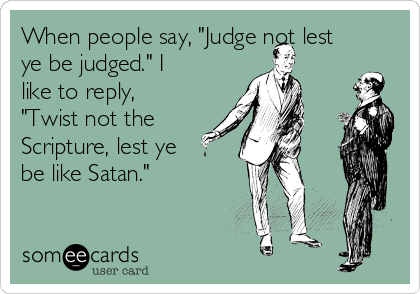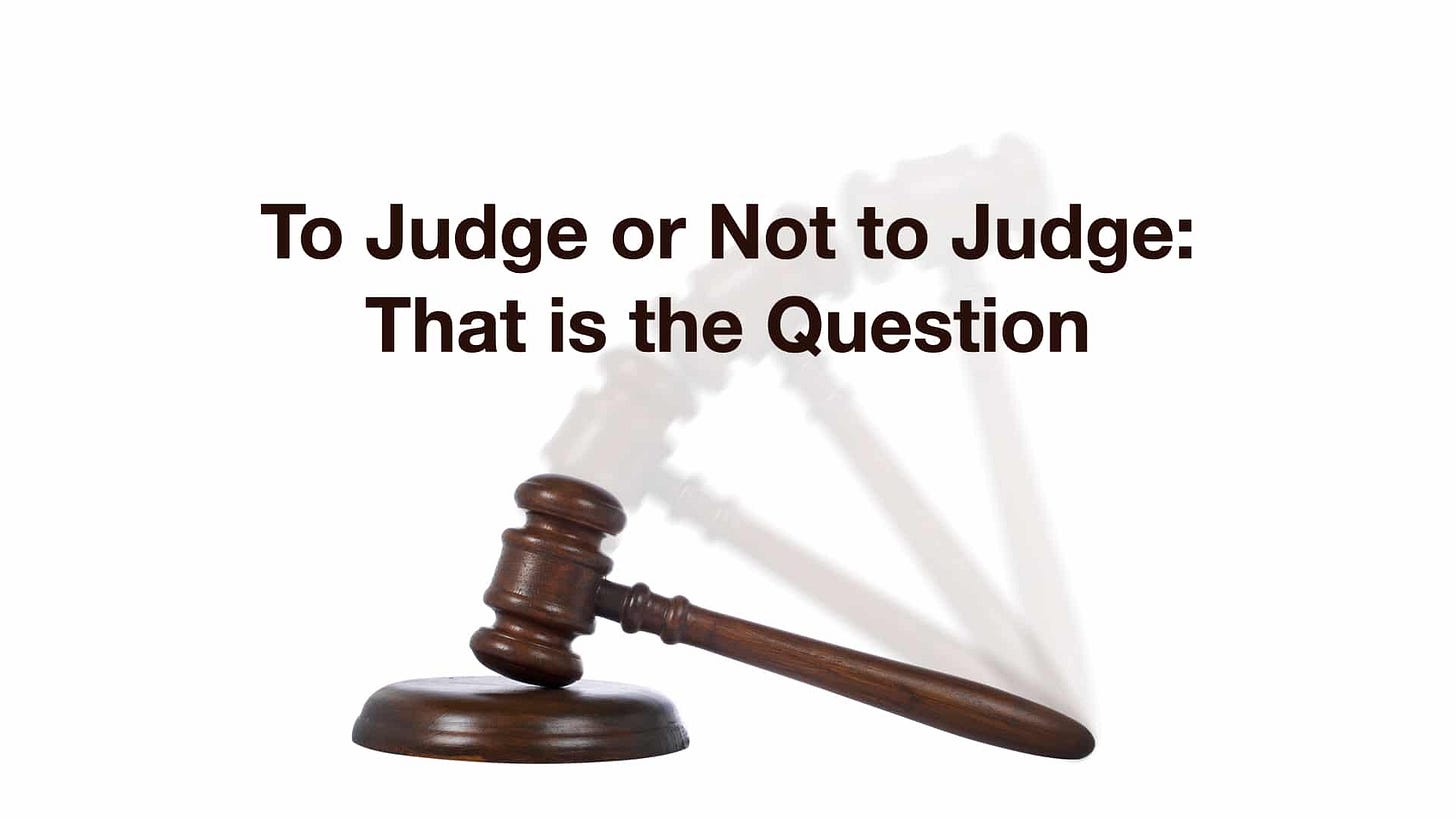To "Judge Not" is to Love Not
Why Christians need to re-think a core platitude
Here's something I don't understand.
We Christians make judgments or evaluations all the time, and see nothing wrong in doing so. Granted, we acknowledge that our judgments can be at fault if they're rash or based on insufficient evidence. But the act of judging/evaluating, in and of itself, is deemed to be both appropriate in everyday circumstances (“This meal/movie/book/ vacation was good/bad”) and at times necessary (“I, a physician, judge that this treatment is in your best interest;” “I, a magistrate, judge that this person should stand for trial”; “I, the Church, judge [at last!] that clerical abuse of children is an abomination.”)
Yet too often, when confronted with genuine, indubitable evil in the world, evil which scripture explicitly condemns, many Christians (at least those who haven’t succumbed to rightwing lunacy; yeah, I’m making a judgment here), and especially clergy, piously intone platitudes like “Judge not that ye be judged” or “Who are we to judge? Judgment is the Lord's” or (my favorite) “We’re called by the Lord to love, not to judge.”
The inconsistency (or worse) in all this astounds and troubles me.
Never mind that each and every one of the biblical verses cherry-picked for this hands-off approach when it comes to judging are actually warnings against hypocrisy, not against righteous evaluation of evil and those who commit it. Never mind that taking Jesus's teaching seriously surely means that we're called to judge individual actions and public policies that harm the types of people he went out of his way to befriend and protect. Never mind that the very countercultural attitude of Christianity is itself a judgment on what St. Paul calls the "world." Never mind that the only way to resist evil is to name it for what it is, and that calls for judgment.
But wait a minute? What about when Jesus says that only one without sin should cast the first stone? Isn't that a warning against judging others?
No. It's a cautionary tale about "judgmentalism," a nastily vituperative and inevitably hypocritical attitude that delights in harshly disproportionate condemnation for the smallest (or no) infraction. Judgmentalism is practiced by weak and resentful people (oops; there I go again, making a judgment!) who refuse to acknowledge that they, like all of us, are judge-penitents, to use the phrase Camus coined in his The Fall, and so should be extra careful and humble when circumstances call on us, as they inevitably will, to pass judgment.
But isn’t judging others incompatible with Christian love? Only if what you mean by Christian love is a vague amiability that refuses to look evil squarely in the face or acknowledge it for what it is. In fact, I’d argue that genuine judgment is always founded on love: love of the good, love of wholeness, love of justice, love of integrity—and, let’s face it, love of the God who clearly condemns wickedness. You simply cannot read the Torah, the Psalms, the Prophets, or the New Testament without coming to that conclusion. To love is to seek to preserve; wickedness always seeks to destroy; therefore wickedness should be called out for what it is: should be judged. Refusal to judge bespeaks an absence of genuine love.
There are, I suppose, any number of reasons why Christians refuse to judge. Sometimes refusal to judge may be born out of a genuinely deep sense of unworthiness. I can respect this, but I think it accounts for no more than a tiny percentage of refusals. More often, I suspect that Christians shy away from judgment because we’ve simply swallowed the platitudinous “judge not lest ye be judged” bromide we’ve been fed in Sunday School and from the pulpit. Or refusal might be because we’ve (rather snootily) convinced ourselves that worldly concerns aren’t worthy of our attention. Our only interests, we say, are in spiritual things.
But most often, I suspect that our pious Christian refusals to judge are actually subterfuges for ducking moral and spiritual responsibility in the face of evil. Thoughts and prayers, we sanctimoniously intone with eyes properly lifted heavenwards. Thoughts and prayers.
Jesus wept.
Judge not lest ye be judged? Yeah, sure, sometimes. But also: Judge when ye should, lest ye be judged for sitting on thy hands.
###





Well done! Thanks, Kerry!
The fundamental "problem" with the Bible as moral guide ... or any sort of guide ... is the "cherry picking" aspect. You can use it to support the "judge not" idea or to support the idea that one cannot allow.a witch to live, etc. I believe that good women and men (like yourself), Kerry, make the religion good; NOT the other way around. Insofar as I know, this applies at least to all sects and all theistic and poly-theistic religions; perhaps ultimately to all ideologies. I make the distinction because I believe that Buddhism properly understood fails to meet the Western standard of a religion ... more like philosophy or ideology because it acknowledges that all the "gods" are created by man - not the other way around - and that they are symbols of human and natural phenomena. .